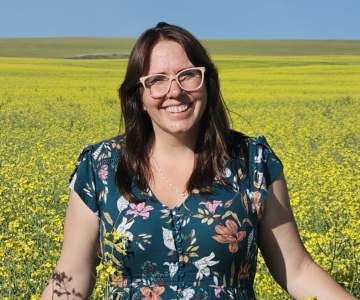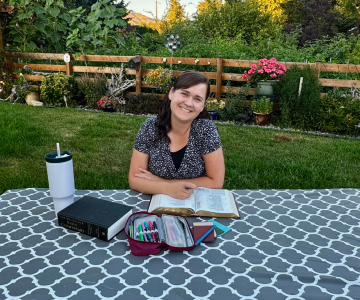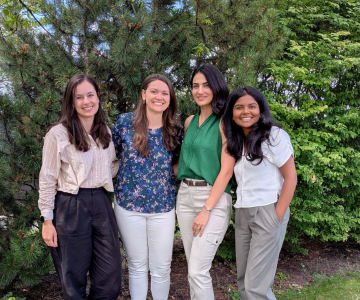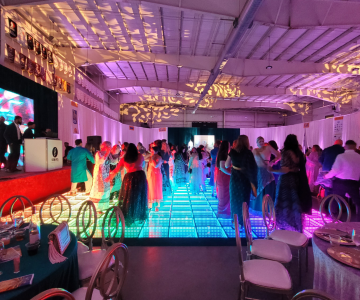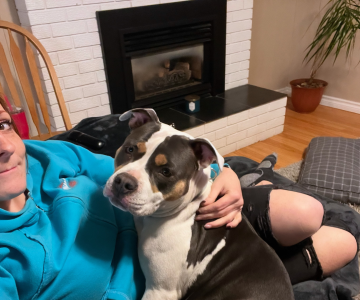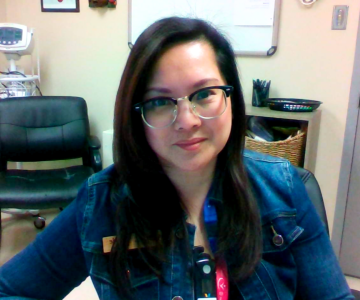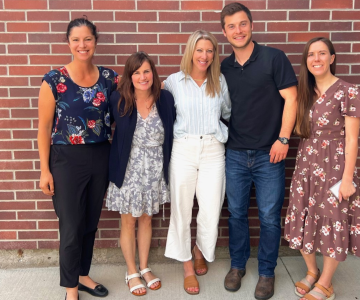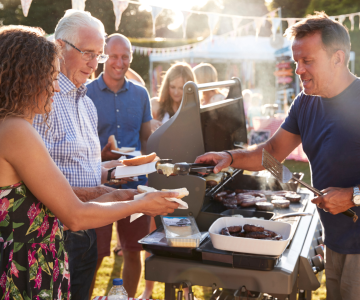Breadcrumb
Explore Stories
Community & Culture
Name: Stefanie Elliott (she/her/hers)Job Title: Complex Care Housing Team LeadLength of Service: 11 yearsWorksite: Mental Health and Substance Use Complex Care HousingCommunity: KamloopsAncestral Territory: SecwépemcFavourite Quote / Advice to Live By: “Choose a job you love, and you will never have to work a day in your life.” — Confucius
Stefanie Elliott is a Mental Health and Substance Use (MHSU) Complex Care Housing team lead originally from Vancouver Island. She moved to the Tk'emlúps (Kamloops) area in 2000, then travelled the world from 2015 to 2019.
Stefanie believes it’s essential to build strong relationships with coworkers and clients and learn who they are as individuals. “To have your genuine self be accepted by others gives a feeling of belonging,” she says. “Each person has their struggles and strengths—it’s an honour to have these valued relationships in my life.”
Community & Culture
Name: Sarah Kozin (she/her/hers)Job Title: Project Coordinator - Digital HealthLength of Service: 12Worksite: Kelowna Community Health and Services CentreCommunity: VernonAncestral Territory: syilxFavourite Quote / Advice to Live By: Romans 8:28And we know that all things work together for good to those who love God, to those who are the called according to His purpose.
For Sarah Kozin, making a difference isn’t about being in the spotlight: it’s about knowing that her work, whether big or small, helps improve care for patients, families and communities. That quiet drive, paired with a deep sense of purpose, has shaped her 12-year journey with Interior Health.
Based in Vernon, B.C., where she has lived her entire life, Sarah is a project coordinator with Digital Health. She’s worked across a variety of roles, building strong relationships, deepening her skills and staying grounded in what brought her to health care in the first place.
“I pursued a career in health care because it is deeply personal to me,” she says. “My own mother is a two-time cancer survivor, and witnessing her journey and the incredible support we received from the health-care team showed me just how vital a strong, compassionate and effective health-care system is.
“It was through those challenging times that I truly understood the power of a dedicated care team in supporting not just individuals but entire families and communities.
“Every step I take to support and improve health care has a ripple effect that helps patients, families and entire communities. That connection fuels me. It reminds me why I show up every day and why I continue to push myself to do better for the system, for the people in it, and for everyone who depends on it.”
Health & Wellness
Have you ever wondered what happens behind the scenes to make our facilities and health-care services more environmentally sustainable?
Our Environmental Sustainability, Population & Public Health, and Energy Management teams are setting the course—but they’re not embarking on this work alone.
Departments across Interior Health (IH) are working together to make our health-care system more sustainable. Get to know a few of the IH teams that are leading the way—including Laboratory Services, Pharmacy Services and the Simulation Team— in making health-care delivery more eco-friendly.
“It's so exciting to be part of the dynamic Environmental Sustainability team at IH,” says Dr. Ilona Hale, medical director of Climate Change and Sustainability. “Seeing IH’s Climate Change and Sustainability Roadmap come to life through the efforts of so many passionate, caring, dedicated IH staff is inspiring. No matter what your role or position, you can embed sustainability into your work and really make a difference—for our patients and our planet, for today and for the future.”
Community & Culture
Foundations in the Interior region raise funds that support medical equipment, care needs, and innovative local initiatives in their communities. Each organization includes respected community leaders, volunteers and staff who are passionate about meeting the needs of patients and families in Interior Health. Thanks to the generosity of their supporters, we all have a stronger health system.
In this next story of our series on the incredible health-care and hospital foundations throughout our region, we interviewed Fiona Harris, director of development at Shuswap Hospital Foundation.
Community & Culture
Name: Jessica Calder (she/her/hers)Job Title: Medical Office Assistant (UPCLC) and Peer Volunteer (MHSU)Length of Service: 2-plus yearsWorksite: Kamloops South Shore Urgent Primary Care and Learning Centre (UPCLC) & Kamloops communityCommunity: KamloopsAncestral Territory: Secwépemc
Jessica Calder experiences health care’s front line through different angles in her positions with Interior Health.
She works full-time as a medical office assistant (MOA) at the Kamloops South Shore Urgent Primary Care and Learning Centre, where she interacts with patients looking to see a health-care professional for their concerns.
A Kamloops resident for 37 years, Jessica gets out into the community as a Peer Support Volunteer for Mental Health & Substance Use (MHSU) on her days off. She said this role involves a lot of walking around downtown Kamloops, checking in on people and seeing if they need anything, and handing out harm reduction supplies.
“I love to help others, especially the vulnerable population and people who may be experiencing homelessness,” Jessica says. “I work in health care as a Peer and a MOA because I can give back. I had a staff member at MHSU recommend me as a Peer and I’m so grateful that she did."
Health & Wellness
IH’s Adult Substance Use Day Treatment program is a free six or eight-week community-based service for adults 19-plus. It’s designed for those seeking support and treatment for substance use and who are ready to make changes based on their personal recovery goals. The program offers a welcoming, stigma-free environment in community settings close to home.
Janine Frey, who holds a master’s degree in social work, is a substance use clinician and Day Treatment facilitator with the program. Based in the Kootenay Boundary region, Janine has been a clinician since 2017. For her, supporting individuals on their recovery journey through the Day Treatment program is an honour.
Substance use clinician and Day Treatment facilitator Janine Frey.Janine describes meeting with clients as the best part of her day. “We begin each session with a check-in guided by the Indigenous Medicine Wheel. Every gathering centers around a weekly theme—such as self-regulation, social connection, or grief and loss. Educational materials such as PowerPoint slides, videos, handouts and trusted online resources are also shared.
“Following a short break, we come back together to discuss, reflect on, and integrate what we’ve learned by applying it to our individual recovery journeys, while offering mutual support. We close with a check-out, and review homework activities that participants can practice between sessions and over the weekend.”
“Our wonderful, brave clients meet me with grace and humility,” she adds.
Community & Culture
Name: Marie May Zubot (she/her/hers)Job Title: Manager, Clinical Operations, Long-Term CareLength of Service: 5 yearsWorksite: Poplar Ridge, Kootenay Boundary Regional HospitalCommunity: Trail / Kootenay BoundaryAncestral Territory: KtunaxaFavourite Quote / Advice to Live By: “Vulnerability is not winning or losing, it's having the courage to show up and be seen when you have no control over the outcome.” —Brene Brown
Marie Zubot moved to the Kootenays in 2004 with her husband and three children for a better quality of life and access to the beautiful outdoors and activities that the B.C. Interior offers. They love fishing, hiking, camping and swimming, and in the winter, head to the hills for some snowboarding and ice fishing.
“I fell in love with life in the Interior," says Marie. "Our communities are tight knit and comprised of the hardest working people you’ll ever meet. Everywhere you go, you can find a place to belong, and people truly come together in times of hardship.”
Inspired by her community, and what quality of life can be, Marie began her career in health care with a desire to broaden her understanding of what well-being truly means. For Marie, choosing health care as a career meant the opportunity to use her clinical knowledge, lived experience, and lessons to improve the quality of life of her communities, with the person in care at the centre.
Health & Wellness
New guidelines for emergency departments (EDs) for recognizing and supporting people at risk of suicide have already increased rates of suicide screening and are expected to save lives.
In 2020, suicide screening in EDs was added as a requirement by Accreditation Canada, a national organization that assesses health-care services and programs.
Interior Health (IH) collaborated with the Canadian Mental Health Association BC and UBC Okanagan (UBCO) to do an in-depth study in the region’s EDs. Led by Dr. Lesley Lutes, along with a team of graduate students, and supported by IH Emergency Services Network regional education coordinator Amy Luff, the UBCO researchers evaluated suicide screening within IH EDs. This included reviewing charts and receiving feedback from both frontline providers and patients.
Findings indicated that suicide screening was being done in EDs less than 10 per cent of the time.
“I have been working in emergency nursing for more than 20 years,” says IH Emergency Services Network director Lisa Hobenshield. “Generally, we are comfortable in a trauma room or resuscitating patients. Having a therapeutic conversation about somebody’s mental health or their substance use is challenging in an emergency setting.
“Yet, the emergency department is where people come to get help,” she continues. “We look at this collaboration as an opportunity to try and change the culture, reduce stigma and help people where they are at.”
Community & Culture, Health & Wellness
Summer’s here and that means backyard barbecues, picnics, beach days and campfire cookouts.
But before you load up the cooler, there’s one thing to keep in mind: warmer temperatures can turn your feast into a fast-track to foodborne illness (food poisoning) if you’re not careful.
Bacteria grow and thrive in the heat, and food safety gets trickier when you’re cooking and eating outdoors. Common causes of foodborne illness include campylobacter, salmonella, E. coli, listeria and norovirus.
-
Load More
Showing 81 of 833
Sign up for email updates
Receive news, alerts, public service announcements and articles right to your inbox.


